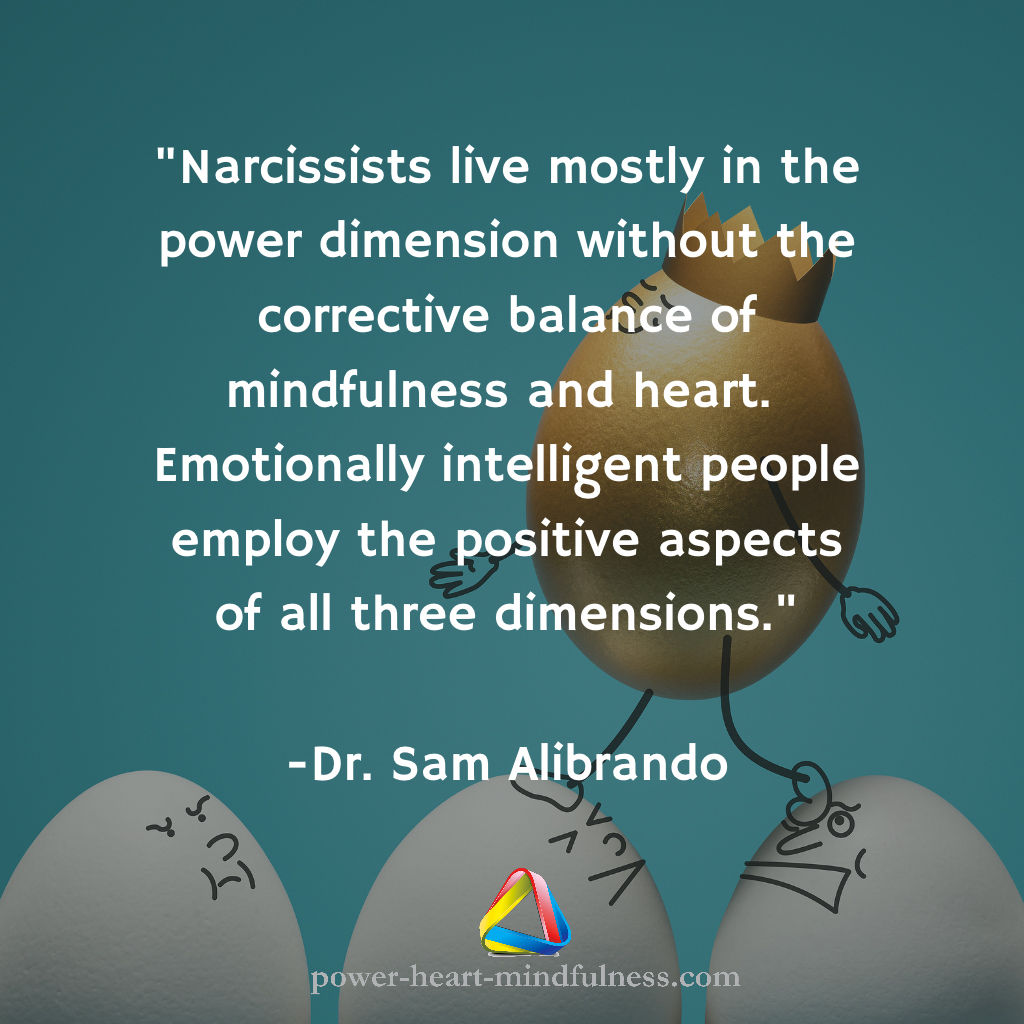How does narcissism fit with the three-dimensional model of emotional intelligence? Today we’ll answer that question, but stay tuned: In future posts, I’ll cover how narcissism relates to leadership, partnership, and parenting. This is a series you’ll want to follow because it’s likely you have had either a boss, a spouse or a parent who is (or was) a narcissist. You may even be a narcissist yourself (although you have likely stopped reading this by now if you are).
The term, “narcissism” comes from the Greek mythological figure, Narcissus, who rejected the advances of the nymph Echo. As his punishment, Narcissus was sentenced to fall in love with his own reflection in a pool of water—thus imprisoned forever by the endless preoccupation with his own image. This has been the plight of the narcissist ever since.
There are many definitions and diagnostic descriptions of narcissism. Here is a description that I find simple yet very helpful. James Masterson identified what he called the “Seven Deadly Sins of Narcissism:”
- Shamelessness. Actually, narcissists have enormous amounts of deep-seated shame (not to be confused with guilt). It is so strong that the narcissist cannot process shame in a healthy way, so instead they often simply act without shame.
- Magical Thinking. Narcissists see themselves as near perfect. To maintain this belief they must use distortion and illusion—or magical thinking—to hide any imperfections, projecting shame and blame onto others instead.
- Arrogance. They are preoccupied with their own grandiose self-importance. They protect their delusional self-view by diminishing and degrading anyone who threatens it.
- Envy. As “great” as they imagine they are, narcissists are plagued by envy of what others possess or have achieved. They are constantly competing for the superior position.
- Entitlement. They hold an unreasonable expectation of favorable treatment, often holding blatant double standards––what’s not good for the gander is still somehow good for the goose.
- Exploitation. They exploit people, places, and things without regard to rules of law or the feelings or needs of others. And of course, people are expendable.
- Bad Boundaries. They do not respect others as psychologically separate from themselves but see others (especially those close at hand like spouses, children, employees) as mere extensions of themselves and their needs. When these “boundaries” are offended, the narcissist will often become enraged at the alleged offender(s).
Does this sound like anyone you know, grew up with, worked for, are married to or who run organizations or governments? It’s important to note a few things:
- There are varying degrees of narcissism (from mild to malignant).
- It comes in various forms and flavors (e.g. there are “soft narcissists” who disguise their “hard” narcissism by playing the role of the Grand Helper).
- Most people have some degree of narcissism.
Clinical narcissism, which is what we’ll be discussing, goes beyond the “normal” narcissistic tendencies that most of us possess. This type and degree of narcissism is destructive to everyone: families, communities, organizations, and countries.
Quite a bit has been written about narcissism. The unique angle that I can contribute to the discussion comes from the three-dimensional model of emotional intelligence described in my two books (Follow the Yellow Brick Road and The Three Dimensions of Emotion). The 3 dimensions are:
- Power (the Lion or Red dimension) is oriented around the “Self.” The positive expression of Red has to do with self-respect, self-regard, setting good boundaries, confidence, and non-destructive candidness. In its negative expression, it demonstrates shamelessness, magical thinking about one’s own importance, arrogance, envy, entitlement, exploitation and poor boundaries (does this list sound familiar?)
- Heart (the Tin Man or Blue dimension) is oriented around the “Other.” The positive aspects of Blue have to do with love, caring, healthy dependency, vulnerability, and empathy. In its worst expression, it involves self-deprecation, depression, weakness, co-dependency, etc.
- Mindfulness (the Scarecrow or Yellow dimension) is oriented around “Knowing.” The better more positive aspects of Yellow include wisdom, patience, self-control, differentiation from others. In its worst expression, it comes across as emotional detachment, indifference, and avoidance.
The most useful way to understand (and eventually deal with) a narcissist using the three-dimensional model is actually quite simple: Narcissists live mostly in the power dimension without the corrective balance of mindfulness and heart. Emotionally intelligent people employ the positive aspects of all three dimensions, but narcissists have all the worst attributes of Power without vulnerability, empathy, care or respect for others, or ownership of their own faults (these missing aspects are all Heart attributes). They are also without self-control, and without patience or tolerance for frustration and complexity (attributes of Mindfulness). And when you don’t have the correction of +Blue and +Yellow, your Red will always be out of kilter and negative (shamelessness, magical thinking about one’s own importance, arrogance, envy, entitlement, exploitation and poor boundaries).
Can you think of people in your life who could be described this way? We’ll talk more about how emotional intelligence relates to leaders (and parents and partners) in subsequent articles. So, stay tuned.
